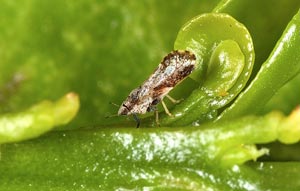Serious citrus pest spreading in SLO

Asian citrus psyllid. Image from Wikipedia.
Insect trappers from the San Luis Obispo County Department of Agriculture have found more adult Asian citrus psyllids in a residential neighborhood in northern San Luis Obispo. Three adult psyllids were found on a single property located very close to the original site in the northern part of the city of San Luis Obispo.
Asian citrus psyllids is an insect that could spread Huanglongbing, also called citrus greening disease, a plant disease that is fatal to all types of citrus trees. A single citrus tree infected with Huanglongbing was found in a Los Angeles County backyard in 2012. To date no additional detections of the disease in California have occurred. The disease does not affect human or animal health and citrus fruit is safe for human consumption.
Regulations restricting the movement of citrus nursery stock and citrus fruit have been established by the California Department of Food and Agriculture to prevent the spread of this serious plant pest. Control efforts are currently underway in the area immediately surrounding all detection sites.
“The discovery of additional psyllids is of serious concern to local citrus producers, residents and regulatory officials. The focus of our work will be to continue to monitor for the presence of psyllids through intensive trapping, visual inspection of citrus plants and suppressive treatments to keep this pest out of local commercial citrus orchards and residential landscapes” according to Martin Settevendemie, agricultural commissioner for San Luis Obispo County.
Staff from the San Luis Obispo County Agricultural Commissioner’s office and officials from the California Department of Food and Agriculture monitor hundreds of insect traps placed in urban neighborhoods and commercial orchards throughout the county.
Community members can do the following to protect backyard citrus trees and the local citrus industry:
- Buy local. Purchase citrus trees from reputable local sources selling plants that have been routinely inspected by the Agricultural Commissioner’s staff.
- Do not transport citrus plants or plant parts into the county from quarantine areas. Call (805) 781-5910 for information about quarantine areas.
- Inspect citrus trees often for strange insects or a white, waxy substance secreted by young psyllids. Contact the local University of California Cooperative Extension’s Master Gardener Program at (805) 781-5939 for help identifying unusual plant symptoms or insects.
- If asked, allow the agricultural commissioner’s staff to place an insect trap in your yard and cooperate with officials if it becomes necessary to exclude or eliminate Asian citrus psyllid from San Luis Obispo County.
- Citrus fruit sold in grocery stores, farmers’ markets or harvested from backyard trees is safe to consume as the psyllid and the Huanglongbing disease do not affect human health.
For more information about the Asian citrus psyllid visit the California Department of Food and Agriculture website at http://www.cdfa.ca.gov .





















